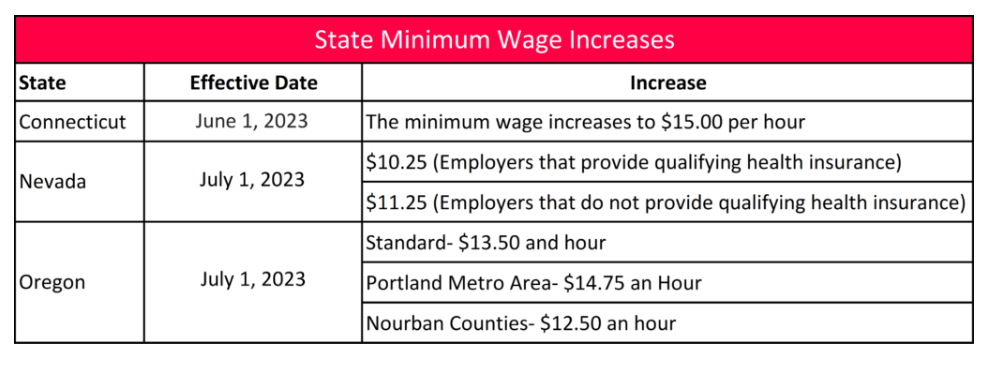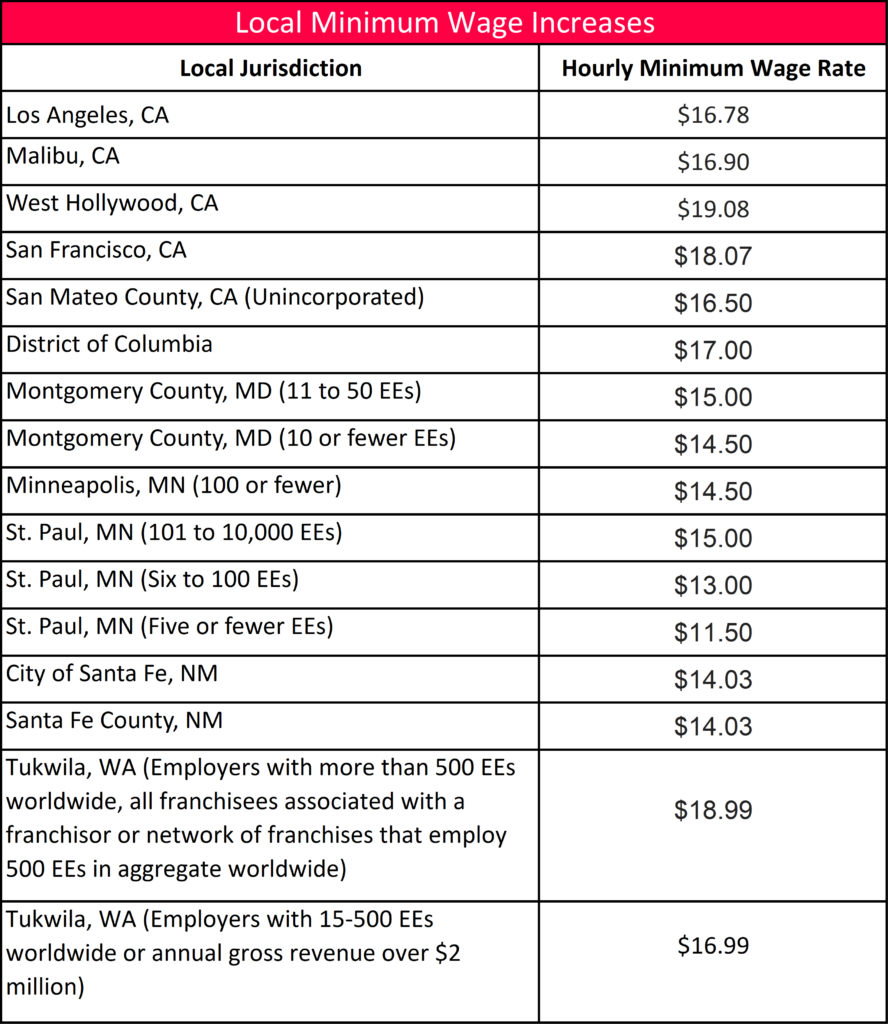The topic of minimum wage increases and compliance modifications is frequently debated in the United States. The federal minimum wage has not been adjusted in nearly a decade, causing various states and cities to independently raise their minimum wages in response to stagnating wages. Consequently, a range of minimum wage rates now exists throughout the country, creating a complex and puzzling situation for both employers and employees.
Please note that the lists of minimum wage rates provided below are not comprehensive. There may be other state and local jurisdictions that have planned increases or additional employees that are affected. To guarantee compliance with fluctuating minimum wage rates, it is recommended that you regularly monitor the government websites that pertain to your specific jurisdiction. This will enable you to stay up to date on any adjustments or revisions to the minimum wage rates that apply to your business and help you avoid any potential noncompliance issues.

Local Minimum Wage Increases
Effective July 1, 2023 several jurisdictions also increased their minimum wage effective July 1, 2023.

State , District, and Local Compliance Updates
In addition to minimum wage increases, there have been several compliance changes recently. For example, the Fair Labor Standards Act (FLSA) was amended in 2023 to increase the overtime threshold and require employers to provide paid sick leave. The following changes are important for employers, as they can have a significant impact on their business.
California
April 1, 2023
Los Angeles adopts scheduling ordinance for retail sector. The City of Los Angeles will require large employers in the retail sector to follow certain scheduling practices such as schedule changes and providing schedules in advance, among other things.
May 10, 2023
California amends pay data reporting rules. A private employer with 100 or more employees must submit a pay data report covering the prior calendar year to the state on or before the second Wednesday of May each year.
Connecticut
July 1, 2023
Connecticut expands voting leave requirement. Connecticut has expanded the circumstances under which employees may use voting leave under state law to include being an elector in a special election held for a judge of probate.
District of Columbia
May 1, 2023
Washington, D.C., phases out tipped credit. The D.C. Council in an emergency session, revised the effective date of the $6.00 minimum cash wage for tipped employees to May 1, 2023.
July 1, 2023
Washington, D.C., increases cash wages for tipped employees. Washington D.C. approved the second increase to the minimum cash wage for employees to $8.00 per hour.
Maine
April 1, 2023
Maine establishes state-run retirement program. Beginning April 1, 2023, covered employers that have 25 or more covered employees and don’t offer a retirement plan must offer the state-run retirement program. Smaller employers have a later deadline.
Michigan
June 14, 2023
Michigan amends nondiscrimination law. Michigan has enacted legislation to expressly prohibit discrimination in employment based on sexual orientation or gender identity or expression.
Minnesota
February 18, 2023
St. Paul amends sick leave requirement. St. Paul has amended an ordinance that requires employers to provide paid sick leave to employees.
July 1, 2023
Bloomington amends sick leave requirement. Bloomington has amended an ordinance that will require employers in the city to provide sick leave to employees.
New Jersey
April 10, 2023
New Jersey Amends WARN Act. New Jersey has made significant changes to the NJ WARN Act, despite Executive Order 103 and the State of Emergency still being in effect.
August 5, 2023
New Jersey enacts Bill of Rights for temporary workers. The “New Jersey Temp Worker Bill of Rights” increases the rights of certain temporary workers.
Pennsylvania
Within 60 days of the rules publication in the Pennsylvania Bulletin
Pennsylvania updates protected characteristic definitions; adds hairstyle protections. The Pennsylvania Independent Regulatory Review Commission has approved amendments to the Pennsylvania Human Relations Act, which provide new definitions of race, sex and religious creed, and effectively protect against hairstyle discrimination.
Utah
May 3, 2023
Utah restricts vaccination or immunity status requirements. Many employers are prohibited from requiring proof of immunity or vaccination for employment decisions.
July 1, 2023
Utah employers may petition for a protective order. Employers that reasonably believe workplace violence has occurred against them or an employee may petition for a workplace protective order.
Virginia
July 1, 2023
Virginia creates state-run retirement program. Enrollment for the Virginia state-administered individual retirement account program will begin on or about July 1, 2023.
Washington
March 23, 2023
Seattle prohibits caste discrimination.
Seattle has passed legislation which adds caste as a protected characteristic under Seattle law.
July 1, 2023
WA updates Cares Act. Washington has delayed the .58 percent premium collections from employee wages to July 1, 2023.
July 31, 2023
Washington clarifies subminimum wage for individuals with disabilities. Subminimum wage certificates that have not expired as of July 31, 2023 will remain valid until their expiration date.
Conclusion
Employers should review their minimum wage and compliance policies and procedures to ensure that they are in compliance with the law. They should also review their overtime and paid sick leave policies to ensure that they are prepared for the upcoming changes.



